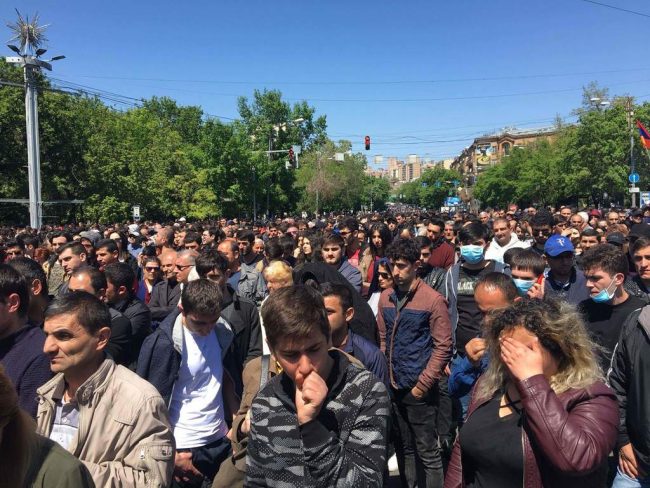
 Ex-president Serzh Sargsyan has been sworn in as prime minister by Armenia’s parliament, the National Assembly, by 77 votes to 17. Mass-protests in Yerevan went into a fifth day on Tuesday, with thousands coming out to protest Sargsyan’s appointment, reportedly surrounding government buildings and clashing with police. Opposition leader Nikol Pashinyan called for a campaign of ‘total disobedience’, declaring the movement a ‘velvet revolution’.
Ex-president Serzh Sargsyan has been sworn in as prime minister by Armenia’s parliament, the National Assembly, by 77 votes to 17. Mass-protests in Yerevan went into a fifth day on Tuesday, with thousands coming out to protest Sargsyan’s appointment, reportedly surrounding government buildings and clashing with police. Opposition leader Nikol Pashinyan called for a campaign of ‘total disobedience’, declaring the movement a ‘velvet revolution’.
Clashes with police continued on Tuesday, with at least 29 people detained, according to RFE/RL. Estimates of the number of protesters reached the 10s of thousands.
Armenian opposition leader Nikol Pashinian has called on supporters to wage a campaign of "total disobedience." The police has detained at least 29 activists during ongoing protests over former President Serzh Sarkisian's move to retain power as prime minister. #ArmenianProtests pic.twitter.com/T4FqC6dZ9K
— RFE/RL (@RFERL) April 17, 2018
Protesters surrounded several government buildings Tuesday afternoon, with police attempting to forcibly remove them, according to EVN Report.
Gala TV reported a small protest in Armenia’s second city, Gyumri, in the north-west.
A spokesperson for the Civil Contract party told OC Media after the appointment that protesters were occupying the Prosecutor’s Office and Court of Cassation, and were heading to Ministry of Foreign Affairs. She said Pashinyan was calling on ‘all citizens to turn to peaceful disobedience and to block public institutions’, and to gather at Republic Square at 18:30 on Tuesday.
Following Armenia’s recent shift to a parliamentary system of governance, the post of prime minister became the most powerful one in the country.
Serzh Sargsyan’s appointment on Tuesday has been accompanied by a wave of mass protests that erupted on Friday. Over the following days, several thousand protesters led by Nikol Pashinyan, leader of the Civil Contract party, part of the opposition Yelk coalition, blocked the main streets of Yerevan. On Friday, groups of protesters forced their way into the Yerevan State University and the building of Armenia’s Public Radio on Saturday.
[Read on OC Media: Protests erupt in Armenia ahead of ex-president’s ‘appointment as PM’]
On Monday, several thousand protesters clashed with riot police as they attempted to break the police cordon to move closer to the parliament building. According to RFE/RL’s Armenian service, Radio Azatutyun, police used batons and stun grenades against protesters.
Armenia’s Ministry of Health reported that 46 people received medical treatment on Monday, including six police officers, with one person in serious condition. As of Tuesday morning, the majority had been discharged with twelve people still receiving treatment, including one police officer.
Armenia’s police reiterated that ‘law enforcement bodies can terminate the meeting if they consider that it is otherwise impossible to prevent a disproportionate restriction of the constitutional rights of other persons or public interests’, and called on protesters to ‘stop blocking streets and ensure the normal course of the rally’.
On Monday afternoon, police called on protest leader Nikol Pashinyan to stop the protests or police would ‘disperse the assembly by using force and special means’.
On the same day, Human Rights Watch called on the authorities to ‘refrain from interfering into peaceful assembly’.
According to EVN Report, several men in civilian clothing beat up members of the rally on Monday morning. Several Armenian NGOs, including the Open Society Foundation — Armenia and Helsinki Citizens’ Assembly — Vanadzor Office issued a statement on Tuesday saying ‘the authorities bear responsibility for the possible violence used by the aforementioned [tall men in plain clothes] criminal groups against peaceful protesters’.
‘Directed anger’
Regional analyst Karena Avedissian told OC Media that in these protests, unlike in previous ones, anger has been more directed towards Serzh Sargsyan.
‘While these protests are much better organised than previous ones, with a concrete plan and aim, a strategic distribution of protesters in key parts of town, and even a theme song, the reason for them is similar to previous mobilisations. They are an expression of people’s frustration with the regime. This time, however, their anger is more specifically directed against Serzh Sargsyan for playing the system to remain in power as Prime Minister even as he had said he would not’, Avedissian told OC Media.
Having previously played down suggestions he would run again for political office, Sargsyan announced on 11 April that he would seek the position of Prime Minister.
[Read more about the 2015 Yerevan protests on Open Democracy Russia: The power of Electric Yerevan]




 17 April 2018
17 April 2018


